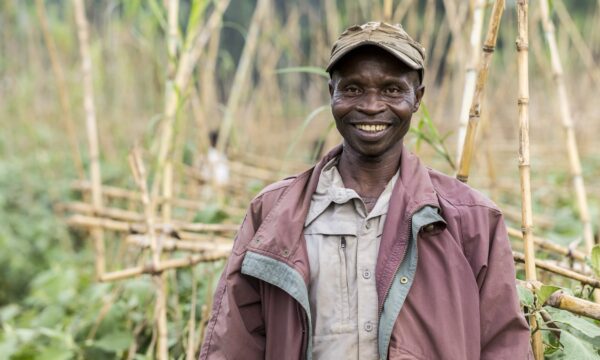
Youth unemployment continues to be a pressing issue in Uganda, particularly among secondary school graduates. The lack of job opportunities not only affects individuals but also poses challenges to the overall development of society, writes Harrison Rware, Monitoring and Evaluation Officer, and Caroline Aliamo, Projects Officer, based at CABI’s regional centre for Africa, Nairobi, Kenya.
In order to address this issue, it is vital to prioritize the training and skill development of young men and women in delivering agricultural services across the entire value chain. This strategic approach provides a viable pathway for employment and income generation, unlocking the potential of youth to drive transformative change within the agricultural sector in Uganda and beyond.
Dr Monica Kansiime the Deputy Director, Development and Outreach, Africa, highlighted that there are high unemployment rates among young men and women in rural areas that may lead to social unrest, economic instability, and a sense of hopelessness. Skilling them for service delivery in the agricultural value chain becomes essential, she said, to unlock their potential and create positive outcomes.
On the other hand, Dr Joseph Mulema, Senior Scientist, Research, emphasized that skilling secondary level leavers to offer agricultural services along the value chain is crucial for their personal development, the reduction of youth unemployment, inclusive economic growth, food security, and the promotion of sustainable agricultural practices. He further added that by investing in their skills and knowledge, we empower these young individuals to become active contributors to the agricultural sector and drivers of positive change in their communities.
Addressing youth unemployment
Young men and women in both urban and rural areas face significant barriers to accessing quality education and diverse job opportunities, leading to frustration and economic instability.
However, these young individuals possess extensive networks, a willingness to take risks, and strong ties to their communities. By providing them with comprehensive training in agriculture, agribusiness management, and marketing, we empower them to contribute effectively to the sector and enhance their employability.
Importance of skilling in the agricultural sector
Providing training and skill development opportunities to young men and women across the agricultural value chain yields numerous advantages, such as creating employment opportunities and generating income. By equipping them with the essential skills and knowledge, they are empowered to actively engage in different agricultural endeavours.
These individuals can choose to become farmers who utilize advanced techniques, agribusiness entrepreneurs involved in value addition processes, or marketers who promote agricultural products. This comprehensive approach not only enhances their own prospects but also contributes to improving food security and fostering sustainable agricultural practices.

Review workshop findings
In November 2022, CABI conducted training as part of the Plantwise programme to enhance the skills of youth in agriculture. The training covered various aspects, including soil testing, spray services provision, pest diagnostics, and management.
The programme also focused on developing soft skills such as problem-solving, critical analysis, social skills, self-regulation, and self-confidence. Additionally, the youths received training in business skills, including entrepreneurship, managerial skills, and financial literacy.
After completing the training, the youths had the opportunity to apply their skills through four months of service provision. In May 2023, a review meeting was held at Zirobwe Agali-Awamu Agribusiness Training Association (ZAABTA) premises in Luwero district to assess their progress.
During the review workshop, attended by 75 youths (20 females and 55 males) affiliated with ZAABTA, the range of services provided by skilled youth was identified. These services included crop pest management, agrochemical handling advisory, fertilizer application guidance, and post-harvest handling advisory.
During this review workshop, it emerged that the youths’ 4 months of dedicated efforts had a remarkable indication of success where they reached an average of over 2000 farmers over four months. However, the actual number of farmers reached varied from 4 to 200, influenced by factors like individual or group visits and the use of a plant clinic model.
The youth also earned an average monthly income of UGX 80,000 from their services, highlighting their value to the farming community. Overall, their efforts covered an estimated 400 acres of agricultural land, making a significant contribution to supporting farmers and enhancing agricultural practices.
The workshop also highlighted the challenges faced by these youth, such as community resistance, limited networking, and transportation issues. In attendance were seven agricultural extension officers, five National Plant Doctor trainers, and five CABI staff members.
Solutions to challenges
To overcome the challenges identified, various solutions were proposed. These included providing transport facilities, offering start-up capital for input shops, and delivering more practical training with demonstrations.
Collaboration with banks and microfinances for financial access, working with district agricultural officers for references, and modelling young farmers under the Ministry of Agriculture, Animal Industry and Fisheries (MAAIF) were also suggested. Simplified materials in local languages, sensitizing local leaders, and frequent monitoring visits were proposed as additional measures.
Areas for further investment
The review workshop identified key areas to invest in for enhancing youth engagement in agriculture. These areas include poultry farming, value addition of agricultural produce, establishing plant nurseries, promoting horticulture, providing financial literacy training, supporting commercial pasture production, and offering soft skills training.
Additionally, suggestions were made to organize plant clinic marathons, conduct tournaments, and implement innovative communication strategies to actively involve youth. The workshop also emphasized the importance of showcasing successful young champions in agriculture as a means to inspire and encourage more youth participation.
Empowering young men and women through agricultural training offers a practical solution to address youth unemployment and foster economic growth in Uganda. By equipping them with the necessary skills, knowledge, and support, they can actively contribute to the agricultural sector, tackle challenges, improve food security, and promote sustainability.
To fully realize the potential of Uganda’s youth, it is crucial for governments, institutions, private sectors, and development partners to collaborate in creating an enabling environment and investing in comprehensive training programs. Only through such collaborative efforts can the youth of Uganda thrive, benefiting individuals, communities, and the entire country.

Additional information
Main image: The training and skilling of young men and women in agricultural services along the value chain is crucial in order to create greater job opportunities (Credit: CABI).
3 Comments
Leave a Reply
Related News & Blogs
How does crop rotation help keep pest populations in control?
Crop rotation is a simple, effective way to manage pests, improve soil health, and boost yields. Suitable for all growers, crop rotation supports sustainable agriculture and reduces the need for chemical inputs. By targeting pest lifecycles and reducin…
6 June 2025





Thank you CABI so much for your love towards the young persons in Uganda
I really appreciate and am proud of CABI because my standards of living changed and my business is improving
Proud of the great work CABI is doing in transforming livelihoods.